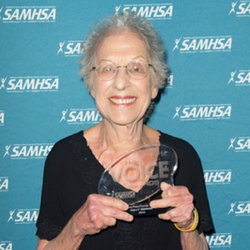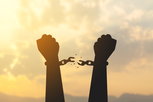 https://www.soberrecovery.com/images/og-image.gif
https://www.soberrecovery.com/images/og-image.gif
Recovery Hero of the Week:
Sally Zinman
By SoberRecovery, Staff Writer
 250
250
https://cimg0.ibsrv.net/cimg/www.soberrecovery.com/250x250_85-1/300/SallyZinman_3-182300.jpg
250
250
https://cimg0.ibsrv.net/cimg/www.soberrecovery.com/250x250_85-1/300/SallyZinman_3-182300.jpg
“Most people talk about medical needs and psychiatric drugs and medication, but it’s much bigger and fuller than that.”
Age: 79
Mental Health Activist
Currently living in Berkeley, CA
Sally Zinman is a recipient of the 2016 SAMHSA Voice Awards. She has been a pioneer of the mental health peer movement since the mid-1970s. She has founded several self-help and advocacy organizations for mental health clients/survivors, been on numerous boards and committees, as well as received several awards from mental health associations and elected officials.
This year, the theme of the Voice Awards was "Strengthening Families Through Hope and Help." In celebration, SoberRecovery will be releasing an exclusive interview with each of the winners every Friday for six weeks.
What does the word “recovery” mean when it comes to mental health?
It’s somewhat different than substance abuse or substance use—and probably a word that was stolen or taken from substance abuse/use—but it means someone who is recovering from their experience of mental health challenges. It could be someone who is living with some challenges but functioning and able to live their full life like anybody else in the community, or it could be, like many of us, people who just totally recover. I mean, it’s different from the way recovery is used from alcohol or drugs—it’s not something that is a demon that we’re constantly dealing with or feeling that we have to address.
So you believe that someone can be completely free from their mental health illness?
Yes, yes. I do not think it’s chronic. I think that people can and do recover all the time. And I think with the right support services, it’s probable that everybody could. Not possible, but probably. And there have been studies that have proven that. I mean, years ago—like as far back as 1988—there was a long-term study that followed people in a back ward of a Vermont hospital. They were let out into the community and given at the time very up-to-date, modern rehabilitation services and more than half recovered. Totally recovered by the standards they were using—not taking medication, living a full life. Everything.
Wow, okay.
And it’s not the normal perspective that people have of what is called “mental illness.” I mean, it’s sort of a whole change of culture in terms of thinking about mental health challenges.
And for yourself, did you gain this perspective when you were researching and studying this topic?
My perspective started with my own incarceration. I’m an ex-mental patient. Years ago, in the early 70s, I had a horrendous experience for two years in a facility, and spent probably the next 3 years recuperating from the experience, as well as the problems I had when I went in, which weren’t changed or helped in any way. In fact, it was one more barrier that I had to deal with—the actual treatment. In my opinion, so much of mental health issues and problems are from trauma, and going into a system just re-traumatizes or exaggerates the trauma.
And then I met people that shared the same thing. Sort of a whole mental health consumer survivor, ex-patient movement for change. My views have broadened and changed with more and more people that I meet, but the basic values sort of were formed then, and they have remained the same values.
And what would you constitute then to be good mental health support?
One, I think you have to meet people where they’re at, wherever that is, and it has to be holistic—that’s very very important, like dealing with the whole person. Most people talk about medical needs and psychiatric drugs and medication, but it’s much bigger and fuller than that. It’s dealing with people’s housing. Affordable and safe housing. Income. We, like everybody else, want jobs. Employment. People’s spiritual life. Friendship. Really, services that address that whole spectrum of a human being.
More and more, these services are in place now, but there’s still not enough of them. Even in California, where I’m from, with the Mental Services Act with Prop 63 that concentrates and focuses on meeting people where they’re at, there’s not enough money. But that, to me, is the way to go. Not hospitalization, force treatment, long-term medication or medication by itself.
What did you find to be the most helpful for you in your personal path of healing?
Well, I took a different track. It was years ago, so there weren’t peer support groups and I didn’t know about this mental health consumer survivor movement. So I was sort of by myself. I settled on a farm for almost 6, 7 years, and became an organic vegetable farmer. And I think healthy exercise and healthy eating and vitamins, I think all that contributed to it. And a lot of soul-searching. But I still had the same problems I went into the hospital with, but was able, by myself, on that farm, to work them out.
So do you believe that the path to mental health recovery looks differently for everybody?
Oh it does look differently and I was fortunate enough to buy a farm. I was fortunate to have the income to be able to do that. Other people don’t. So most people in the public mental health system, they’re in there because they couldn’t go buy a farm. Someone once pointed out to me something years and years ago when I was telling my story that that’s what everybody wants, so they camp out on somebody’s lawn and get into a lot of trouble. Or camp out in the street, or—yeah, everybody’s path is different, but I think that the public mental health system developing services that meet people where they’re at, that are full service, that deal with the whole person and all of our needs, and not just “medical” needs, is really important. But everybody’s path is different. You know what I mostly believe in and I believed in ever since I was incarcerated? Real choice and self-determination. The necessity and how essential it is for people to make their own decisions about their own health at-care. And that is a battle that we are constantly fighting. It is a battle very against force treatment which is law in every single state. But I think the people ultimately can make their own decision and have to have some control over their lives, especially at a time when control is being taken from them.
In your work, what are you most proud to be associated with?
Oh, wow. Well, because of my age, we were really pioneers in creating what we called a consumer survivor mental patient movement of people around the country and around the world working for change. So I’m very proud to be part of that, and see all the generations who have followed me and that that work is still continuing—different directions, but still continuing. I’m proud of being part of the conceptualization of what we call consumer-run programs that didn’t exist 40 years ago, but now are all over the country and flourishing and are big, big agencies. And peer support is a real treatment modality everywhere, not just in consumer-run programs, but also in clinical settings, where peers are helping other peers. And that’s something I was part in developing.
I’m proud of being part of the change of the whole public mental health system, from one that believed in that chronicity that the best you can do is be mentally ill the rest of your life and forget about your life to one that talks about recovery and is really beginning to practice it in some areas. To one that at least appears to be marching more towards voluntary community-based holistic services. Really, to me it was a civil rights movement.
A lot of times our readers come to our site very overwhelmed regarding their mental illness or substance abuse. What would you say would be a good first step for them to getting healing?
Maybe to find a consumer-run program or peer support group in their area. Finding other people like themselves who they can communicate with. I would bet that more than three-quarters of people with addiction have mental health issues too. In a way it’s almost like self-medicating. It’s a different route of dealing with the problems.
Would you like to be featured in our Recovery Hero of the Week series? Send in your story (500–1000 words) to [email protected] and you might just be selected as our next featured hero. Thank you for spreading the message!






